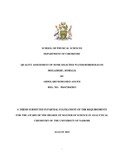Quality assessment of some selected water boreholes in Mogadishu, Somalia
Abstract
The study was undertaken to assess the fluoride content and other parameters in selected borehole
waters in Hodan District area, Southern Mogadishu region, Somalia. Quality water supply is one
of the constraints being experienced in Mogadishu city and fluoride content is of particular
concern. The study was carried out between September 2014 and March 2015. Water samples
were collected from six boreholes in different parts of Hodan District, namely: Rer Mohamed
Sheikh, Gorgor, Umu Batula, Cise Qodax, Soonikia (Digfer) and Umu Caisha (Tarabuun). Survey
was conducted through a questionnaire to identify the water boreholes for water sample
collection. The residents around these water boreholes were interviewed on the water quality and
the health effects experienced in the areas. Each water sample was analyzed for pH, fluoride,
chloride, nitrate, ammonium, alkalinity, water hardness, electrical conductivity, sodium, total
dissolved solids (TDS), cadmium, zinc, lead and E-coli. The results were compared with World
Health Organization (WHO). Values were: pH 8.1-8.9; fluoride 0.28-0.596 mg/l ; nitrate 4.27146.6
mg/l; alkalinity 119.3-158.9 mg/l; electrical conductivity 1.428-3.280 mS/cm; hardness
229.32-501.76 mg CaCO3/l; chloride 281.09-888.85 mg/l; total dissolved solids 1339-3428 mg/l;
ammonium 0.45-0.7 mg/l; sodium 52.4-149.7 mg/l. Lead, cadmium and zinc were not detected.
Hardness, chloride, electrical conductivity, total dissolved solids (TDS) and ammonium values
were higher than WHO standard limits. Alkalinity, sodium and fluoride were all below the WHO
standard limits. Nitrate values were below the WHO standard limit except for Umu Batula (60.92
mg/l) and Rer M. Sheikh (146.6 mg/l) which were higher. pH values were lower except Cise
Qodax (pH= 8.9) which was above WHO value. E-coli was only found in Cise Qodax borehole.
Publisher
University of Nairobi

